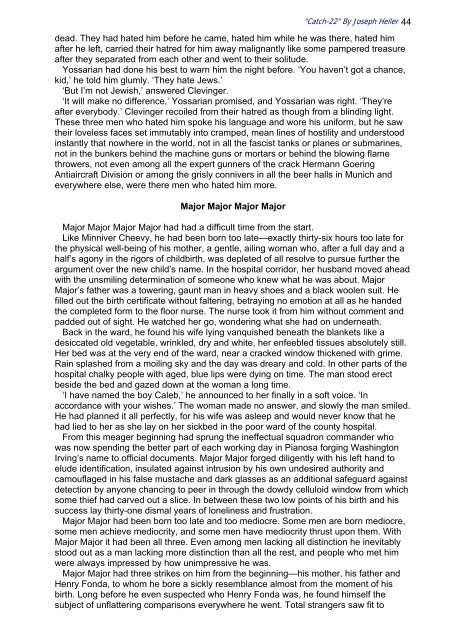You also want an ePaper? Increase the reach of your titles
YUMPU automatically turns print PDFs into web optimized ePapers that Google loves.
“Catch-22” <strong>By</strong> <strong>Joseph</strong> Heller 44<br />
dead. They had hated him before he came, hated him while he was there, hated him<br />
after he left, carried their hatred for him away malignantly like some pampered treasure<br />
after they separated from each other and went to their solitude.<br />
Yossarian had done his best to warn him the night before. ‘You haven’t got a chance,<br />
kid,’ he told him glumly. ‘They hate Jews.’<br />
‘But I’m not Jewish,’ answered Clevinger.<br />
‘It will make no difference,’ Yossarian promised, and Yossarian was right. ‘They’re<br />
after everybody.’ Clevinger recoiled from their hatred as though from a blinding light.<br />
These three men who hated him spoke his language and wore his uniform, but he saw<br />
their loveless faces set immutably into cramped, mean lines of hostility and understood<br />
instantly that nowhere in the world, not in all the fascist tanks or planes or submarines,<br />
not in the bunkers behind the machine guns or mortars or behind the blowing flame<br />
throwers, not even among all the expert gunners of the crack Hermann Goering<br />
Antiaircraft Division or among the grisly connivers in all the beer halls in Munich and<br />
everywhere else, were there men who hated him more.<br />
Major Major Major Major<br />
Major Major Major Major had had a difficult time from the start.<br />
Like Minniver Cheevy, he had been born too late—exactly thirty-six hours too late for<br />
the physical well-being of his mother, a gentle, ailing woman who, after a full day and a<br />
half’s agony in the rigors of childbirth, was depleted of all resolve to pursue further the<br />
argument over the new child’s name. In the hospital corridor, her husband moved ahead<br />
with the unsmiling determination of someone who knew what he was about. Major<br />
Major’s father was a towering, gaunt man in heavy shoes and a black woolen suit. He<br />
filled out the birth certificate without faltering, betraying no emotion at all as he handed<br />
the completed form to the floor nurse. The nurse took it from him without comment and<br />
padded out of sight. He watched her go, wondering what she had on underneath.<br />
Back in the ward, he found his wife lying vanquished beneath the blankets like a<br />
desiccated old vegetable, wrinkled, dry and white, her enfeebled tissues absolutely still.<br />
Her bed was at the very end of the ward, near a cracked window thickened with grime.<br />
Rain splashed from a moiling sky and the day was dreary and cold. In other parts of the<br />
hospital chalky people with aged, blue lips were dying on time. The man stood erect<br />
beside the bed and gazed down at the woman a long time.<br />
‘I have named the boy Caleb,’ he announced to her finally in a soft voice. ‘In<br />
accordance with your wishes.’ The woman made no answer, and slowly the man smiled.<br />
He had planned it all perfectly, for his wife was asleep and would never know that he<br />
had lied to her as she lay on her sickbed in the poor ward of the county hospital.<br />
From this meager beginning had sprung the ineffectual squadron commander who<br />
was now spending the better part of each working day in Pianosa forging Washington<br />
Irving’s name to official documents. Major Major forged diligently with his left hand to<br />
elude identification, insulated against intrusion by his own undesired authority and<br />
camouflaged in his false mustache and dark glasses as an additional safeguard against<br />
detection by anyone chancing to peer in through the dowdy celluloid window from which<br />
some thief had carved out a slice. In between these two low points of his birth and his<br />
success lay thirty-one dismal years of loneliness and frustration.<br />
Major Major had been born too late and too mediocre. Some men are born mediocre,<br />
some men achieve mediocrity, and some men have mediocrity thrust upon them. With<br />
Major Major it had been all three. Even among men lacking all distinction he inevitably<br />
stood out as a man lacking more distinction than all the rest, and people who met him<br />
were always impressed by how unimpressive he was.<br />
Major Major had three strikes on him from the beginning—his mother, his father and<br />
Henry Fonda, to whom he bore a sickly resemblance almost from the moment of his<br />
birth. Long before he even suspected who Henry Fonda was, he found himself the<br />
subject of unflattering comparisons everywhere he went. Total strangers saw fit to
















